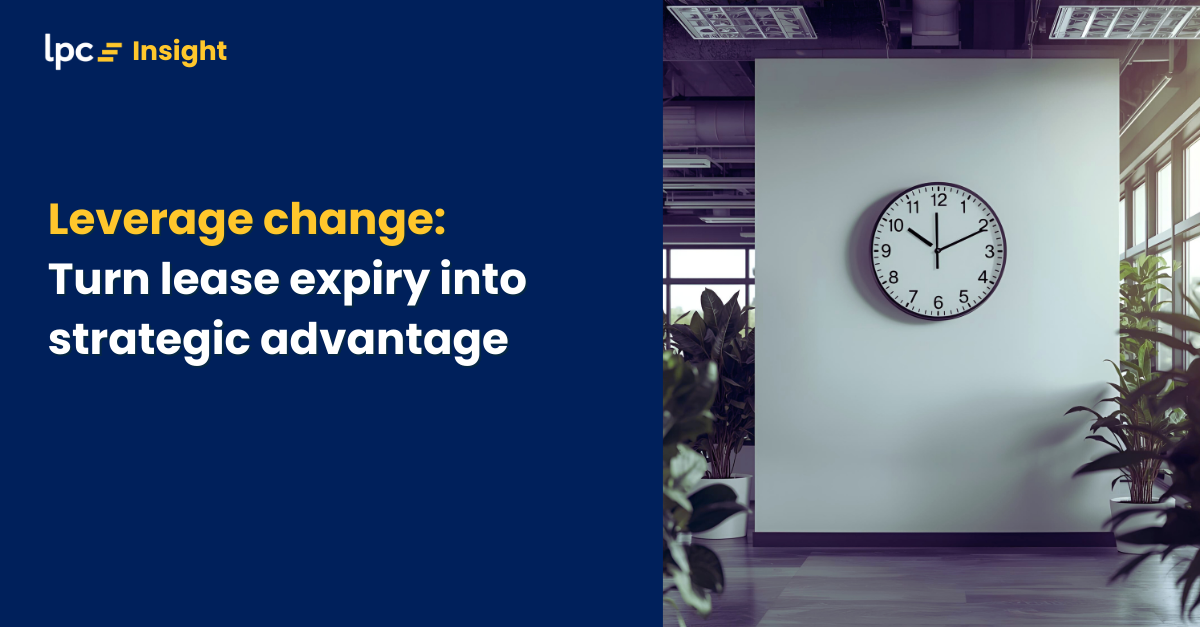‘The only constant in life is change’ - Heraclitus
This series of insights focuses on the challenges commercial tenants face when diverse internal and external changes result in leasing arrangements that are no longer fit for purpose. The root cause is that leasing arrangements are inherently inflexible while businesses have to evolve and adapt. The solution is elusive, but it always requires sound judgment about future accommodation requirements together with lease negotiations that deliver more flexible arrangements.
In business, standing still is not an option
When market conditions shift, your business strategy must adapt. A lease that’s too rigid can erode agility, drain profitability, lock you out of opportunities, and hinder the implementation of an evolving business strategy.
Market shocks are more dramatic than market shifts, necessitating immediate and substantial adaptation of business strategy. The most obvious example of a market shock that has impacted commercial tenants in recent times is the pandemic, which has dramatically affected almost all businesses. The impacts of the pandemic on businesses were far-reaching and diverse, resulting in windfall gains for some, such as Zoom, and irreparable damage for others, including many hospitality businesses that became insolvent. A constant was inflexible commercial leases that provided limited protection for the tenant whose utilisation of the leased premises was impaired. Unchanged lease obligations restricted lessee adaptation to the pandemic shock, particularly for restaurateurs who reduced staff, shifted from dine-in to takeaway, enhanced their online customer experience, but were unable to adapt their leasing commitment to align with the pandemic realities.
A flexible lease enhances a business's capacity to respond to market shocks, as lease flexibility is more supportive of the tenant’s enterprise in changed circumstances, safeguarding margins, supporting growth, and ensuring the business can pivot when required. At LPC, we help commercial tenants make informed property decisions and secure lease terms that align with their evolving business requirements and risks. ‘Futureproof today’ underpins our advice, and lease flexibility is a key focus for our representation.
What is a ‘flexible lease’?
From the commercial tenant's perspective, a ‘flexible lease' structures property arrangements to fuel growth while shielding your business from downside risk. The starting point is to apply the concept of lease flexibility to a specific business for different businesses have different drivers.
For example, foot traffic is a key contributor to a shopping mall retailer's success. In this context, a retailer should seek a level of flexibility in rent and other lease obligations tied to foot traffic, for the extent to which foot traffic is improved or impaired will directly impact the tenant's business.
For a large legal practice operating from multi-floor CBD-leased premises, the need for flexibility remains the same, but the drivers are different. With long tenures, iconic buildings, a prime CBD location, and contained occupancy costs being the key requirements for these tenants, the tenants' need for flexibility is tied to the extent to which the prime location and premises attributes are sustained throughout the term. The extent of occupancy cost is contained and tied to the tenant's utility value. The lessee should seek protection and remedies for deterioration in premises attributes, location appeal, and anything that impairs the tenant's utility value. For example, the pandemic had an immediate and enduring impact on the appeal and utilisation of CBD offices, with the acceleration of the WFH trend. However, irrevocable lease arrangements had been entered into by tenants based on a property strategy and utilisation targets that were no longer applicable.
The point is that lease flexibility is essential for commercial tenants, but the drivers are different for different businesses.
Futureproofing through scenario planning
Smart business leaders align property strategy with multiple possible futures, from aggressive growth to strategic consolidation. By running data-led occupancy scenarios and market comparisons, you can identify precisely where flexibility is worth negotiating and where hidden value can be unlocked. Scenario planning is useful input to lease negotiations, focusing attention on flexible provisions that mitigate risk and enable opportunities pertaining to:
- Market downturns that demand cost control.
- Growth opportunities that call for rapid scale-up.
- Workforce shifts that redefine your space needs.
When property strategy and lease negotiations are underpinned by a ‘futureproof today’ mindset, you leverage the uncertainty of tomorrow and whatever the market brings.
Futureproofing through flexible lease provisions
We cited two very different types of occupier, the shopping mall tenant and the large legal practice. In practice the pursuit of flexible lease provisions looks quite different. In both situations, negotiation is hard yards for the tenant, who starts in the outside lane due to the landlord's power and influence over lease norms, with lease norms designed to achieve passive, risk-free, and escalating rent and outgoings.
For the shopping mall tenant, the consolidation of a small group of powerful landlords is a structural impediment to negotiating flexible leasing arrangements. Nevertheless, tenants do well to direct negotiations towards rent tied to turnover, guarantees relating to foot-traffic, landlord commitments pertaining to shopping mall appeal, and escape provisions where these characteristics are diminished.
For the large legal practice, flexibility is found in break clauses tied to business outcomes or decline in premises/location attributes, expansion and contraction rights allowing you to scale up or down without incurring crippling costs, sublease provisions to unlock value from surplus space, and utilisation provisions.
Why negotiation matters now
Flexibility is easiest to secure before you sign or at critical lease events, such as renewals or expansions. In these moments, market knowledge and conflict-free representation and advice give you an advantage. LPC works exclusively for tenants and occupiers; our advice is uncompromised, conflict-free, and focused entirely on delivering terms that protect and grow our clients' businesses.
Your Next Move
If your current leases don’t have flexibility built into them, they're already a liability. Now is the time to review, reset and reposition your portfolio through a business-first lens and ensure every square metre works hard for your business's future.
Contact an LPC conflict-free advisor who can help you negotiate lease terms that keep your options open, your business resilient, and your bottom line strong, whatever the market brings.


